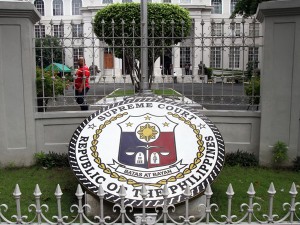MANILA, Philippines—The Supreme Court again issued a restraining order against a Manila court ruling ordering the Bureau of Immigration to release from custody a South Korean national accused of embezzling reserve funds of a firm in his country.
This is the second restraining order issued by the high court against Manila Regional Trial Court Branch 47 Judge Paulino Gallegos.
Last Feb. 4, the high court already issued a restraining order against Gallegos and ruled that Ja Hoon Ku should stay under the Bureau of Immigration’s custody.
Records showed the Korean Embassy wrote the BI to arrest and deport Ja for alleged arbitrary spending of the reserve funds of Seoul-based Phildip Korea Co, Ltd. Upon finding that Ja was a “risk to public interest,” the BI charged him with violating Section 69 of Republic Act 2711 or the Revised Administrative Code as his visa had already expired.
BI Commissioner Siegfred Mison then issued a warrant for his immediate deportation to South Korea. Ja was arrested on January 16 and detained at the BI detention center in Bicutan, Taguig City. The following day, Ja asked the Manila court to issue a writ of amparo and temporary protection order against the BI. Gallegos heard the petition on the same day and ruled in the Korean’s favor.
The BI took the case to the high court, which issued a Feb. 4 restraining order.
Citing the Feb. 4 restraining order by the high court, Mison asked Gallegos last Feb. 11 to dismiss the writ of amparo of Ja but the judge again denied Mison’s request prompting him to again go to the Supreme Court.
Now therefore effective immediately and continuing until further order from this court, you respondents Judge Paulino Gallegos and Ja Hoon Ku, your agents, representatives or persons acting in your place or stead are hereby enjoined from enforcing the assailed order… and from further proceeding with the said case,” said the high court in its latest ruling.
The high court also ordered the Manila judge to comment on Mison’s new petition.
“(The court) directs the respondents to include in said comment a discussion on the issue of whether or not an amparo petition is proper and availing in the case at bar,” the high court said.
RELATED STORY
SC stops transfer of Korean fugitive
